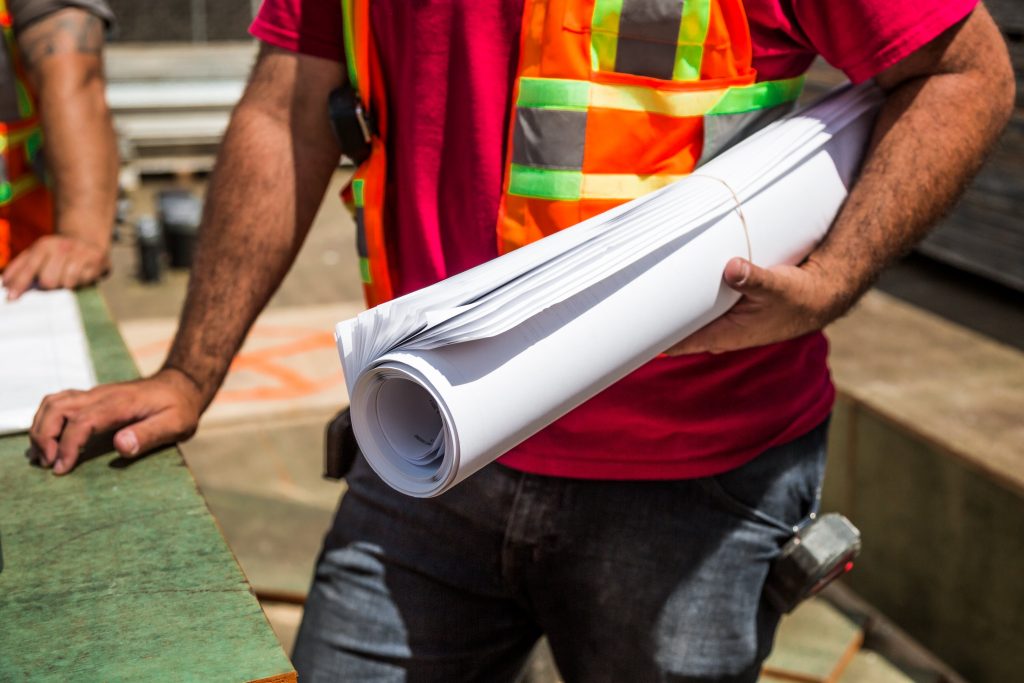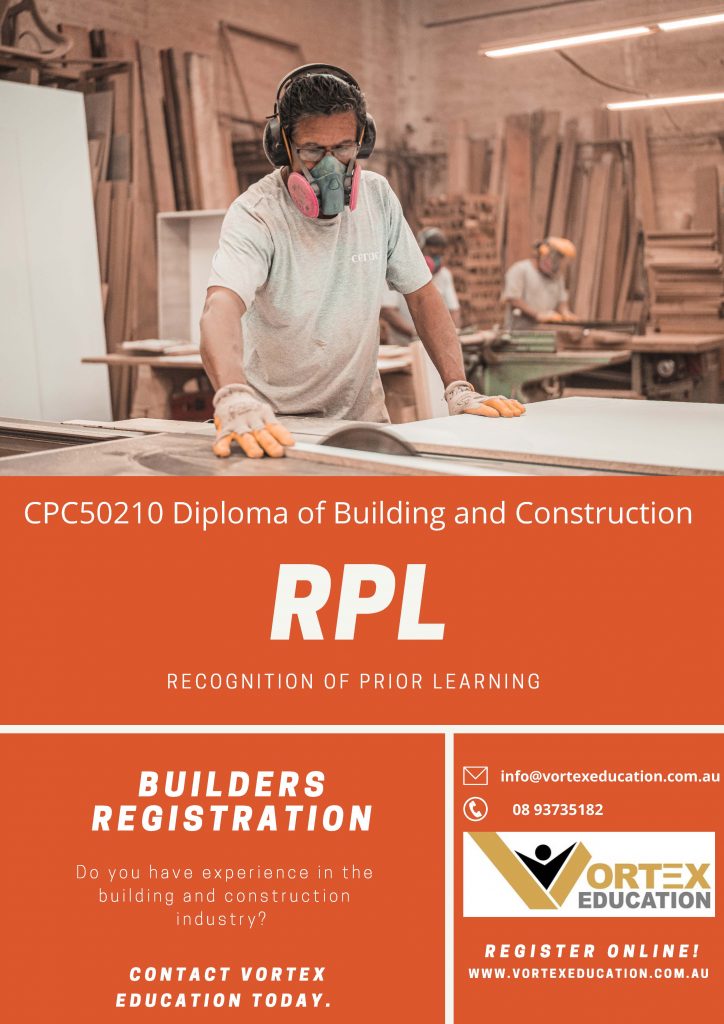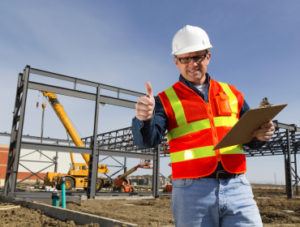Find out what having a Builders license in Victoria can do for you.
What type of work does a registered builder undertake? There are many benefits to becoming a registered builder in Victoria, in the following text we will explain a little more.
Some of the day to day tasks a Registered Builder in Victoria undertakes.
- Conducting inspections of construction sites to identify and eliminate any potential safety hazards
- Minimising work-related accidents and injuries by enforcing site safety rules, working closely with senior management and key stakeholders
- Providing education to site workers on construction safety regulations and accident protocol, including management of site accidents according to policies and procedures
- Recording and maintaining accurate records
- Establishing disciplinary measures as required, by evaluating the performance of employees
- Ensuring construction projects meet design, budget, and safety specifications by analysing blueprints
- Increasing efficiency by actively participating in quality improvement projects and recommending changes to construction operations or procedures
How do you become a Registered Builder in Victoria?
To work as a Registered Builder in Victoria, registration with the Victorian Building Authority is required.
The registration process varies across categories. The following diagram outlines the broad process:

How to get your unrestricted Building License in Victoria.
Domestic Builder (Unlimited)
A person registered in the class of Domestic Builder (Unlimited) is responsible for carrying out, or managing or arranging the carrying out of all components of domestic building work for the construction, renovation, improvement or maintenance of a home (class 1, 2, and 4 buildings, and associated class 10 buildings, as classified in the Building Code of Australia).
Experience needed
You must be able to demonstrate the capacity to carry out, manage or arrange the carrying out of domestic building work, in a competent manner and to a professional standard:
- establishing the requirement for a building permit for the proposed domestic building work
- applying for and obtaining a building permit for proposed work
- complying with a building permit
- arranging relevant certification of completed building work when required
- producing cost estimates and quotations for the proposed work
- identifying the need for, and establishing a major domestic building contract to undertake the work when required
- undertaking relevant planning and preparation for construction
- arranging for construction workers or sub-contractors to carry out construction works safely and competently
- complying with site safety requirements, including the development, communication, monitoring and maintenance of site safety plans throughout the construction
- ensuring site safety inductions are undertaken
- supervising the carrying out of all construction work, ensuring compliance
- with the National Construction Code, Australian Standards and local authority requirements
- ensuring construction is undertaken according to relevant provisions of safety and environmental legislation.
Practical years of experience
- At least 3 years of practical experience.
Courses
The successful completion of:
- a Bachelor of Construction Management and Economics from Holmesglen, or
- a Bachelor of Construction Management (Honours) from Deakin University, or
- a Diploma of Building and Construction (Building) (CPC50210 or CPC50220).
What are the benefits of getting your builders license in Victoria?
Registered Builders have flexible work hours
Despite the hard work builders do, most builders are actually a very content group of people. And this is because the sector places huge importance on building and nurturing strong working relationships, which makes a great deal of sense. Compare our own working lives, the people that we work with are hugely influential to how we feel at work. And the stronger our working relationships are, the better the chance of experiencing enjoyment in work.
Building relationships
As a Registered Builder cements their working relationships, they will come to have a strong network of people to call upon. You may have come across the benefits of networking in a number of careers advice articles, and this is really prominent with being a builder. As the old saying goes: “It’s not what you know, it is who you know.” Up-and-coming builders won’t notice the benefits of having strong working relationships until they become more established or self-employed. An experienced Registered Builder will begin to speak to their contacts to ask for favours. Whether that may be asking for help or getting some stock, thanks to their strong working relationships, it is easier for them to get what they want.
Hiring Others And Giving Back
One of the best perks about being your own boss is that you not only get to create an amazing job and work environment for yourself but for others, as well. By creating your own company and hiring staff, you’re giving back to others, as well as to the local and national economy.
You also have the opportunity to give back to the local community beyond creating jobs. That may mean offering traineeships and apprenticeships to local kids, sponsoring events for local charities, or anything else you can dream up. More businesses than ever are incorporating social change into their models and being your own boss means you can choose to do the same.
Victorian Registered Builder application process.
There are many pathways you can take to obtain your Builders license in Victoria. When applying, choose the pathway that applies the most to you.
Builders license Victoria application process.
- Choose the type of license you want.
There are 30 classes of domestic building work.
People registered in the class of Domestic Builder Unlimited are responsible for carrying out, or managing or arranging the carrying out of all components of domestic building work for the construction, renovation, improvement or maintenance of a home. - Check your eligibility.
Do you have the skills, knowledge and experience to apply for registration as a building practitioner in domestic building work? There are different qualifications and experience requirements for registration in each class and/or component of domestic building work.
- Undertake the applicable qualifications.
To obtain an unlimited building license in Victoria you are required to successfully complete one of the following:
A Bachelor of Construction Management and Economics from Holmesglen, or
A Bachelor of Construction Management (Honours) from Deakin University, or
A Diploma of Building and Construction (Building) (CPC50210 or CPC50220).
Forms required for each application.
- Victorian Builders License application formshttps://www.vba.vic.gov.au/building/registration/domestic-builder
So how can Vortex Education help you with your Builders license in Victoria?
Vortex Education is a Registered Training Organisation (RTO) with the Training Accreditation Council, based in Western Australia (RTO 52916). We strive to deliver exceptional training and assessment from highly qualified and experienced Trainers and Assessors who are leaders in their fields.
Our training programs are nationally recognised and comply with the Australian Quality Training Framework standards for registered training organisations. The quality of our training is rigorously monitored and audited to ensure we provide a high standard of quality service.
Vortex Education is Western Australian based and a registered training organisation managed by the Training Accreditation Council (TAC) and has some of the leading Trainers and Assessors in their fields providing in class and on-line Assistance in Australia.
Why Choose Us?
There are many benefits when you study with us including:
- Flexible learning to suit your lifestyle
- Online and face to face learning depending on the course (Unit of competency chosen)
- Flexibility to help you learn at a time that suits you where possible
- Access to a wide variety of courses
- One-on-one support and assistance by qualified trainers and assessors
- Every effort to provide access to additional assistance if you have any special needs.




What does the Diploma of Building and Construction get you?
What does a Diploma in Building and Construction get you?
What does a Diploma in Building and Construction get you?
Do you want to build a career in the Building and Construction industry?
When you complete the Diploma of Building and Construction (Building) you will be ready for a career as a construction site manager, or (with additional experience) registered building practitioner.
The Diploma of Building and Construction meets the academic requirement for registration as a builder with Building Services Board. (Western Australia)
CPC50210 Diploma of Building and Construction (Building)
This qualification is designed to meet the needs of builders, including selecting contractors, overseeing the work and its quality, and liaising with clients.
The builder may also be the appropriately licensed person with responsibility under the relevant building licensing authority in the State or Territory. Builder licensing varies across States and Territories and additional requirements to attainment of this qualification may be required.
What will you learn studying the Diploma in Building and Construction?
- Communication
- Teamwork
- Problem solving
- Initiative and enterprise
- Planning and organising
- Self management
- Learning
- Technology
- Analyses, evaluates and interprets a range of complex and technical documents, including relevant regulatory, legislative, licensing requirements, codes and standards, plans, drawings and specifications, contracts, reports, reference materials, building approvals, awards and workplace agreements
- Maintains and reports records and information
- Understands relevant definitions, terminology, symbols and language
- Communicates effectively with a range of relevant parties and provides expert testimony
- Establishes site communication procedures
- Prepares complex business documents, including project expenditure schedules and reports, such as technical and legal reports, drawings and project brief
- Negotiates dispute resolution
- Sketches service layouts
- Implements feedback systems
What does a Diploma in Building and Construction get you?
- Demonstrates leadership within work teams and business units
- Collaboratively and effectively develops and implements operational plans
- Supervises work processes and systems, and delegates to others as required
- Works with others to overcome problems and achieve outcomes
- Establishes and maintains effective working relationships
- Seeks advice from senior management as required
- Works collaboratively with relevant stakeholders
- Relates to people from diverse social, cultural and ethnic backgrounds and with varying physical and mental abilities
- Analyses construction, environmental management, and energy conservation problems and applies appropriate and compliant remedial solutions
- Assesses structural integrity of medium rise buildings
- Ensures processes that identify faults and required remedial action
- Develops strategies to address project delays
- Performs various complex calculations relating to cost-benefit analysis, rise and fall amounts, pessimistic overdraft requirements, statistical analysis, costs, set out of construction work, structural analysis and service installations
- Analyses reasons for cost variations and takes remedial action
- Establishes and implements dispute resolution procedures
- Maintains site safety and manages risks
- Provides advice on dispute resolution
- Uses and analyses data in decision making
- Develops and initiates strategies to use resources effectively
- Ensures effective systems’ development
- Implements effective project quality management and continuous improvement processes
- Recommends improvements to environmental management and energy conservation plans
- Develops strategies that maximise resource effectiveness
- Develops and reviews workplace sustainability policy
- Supervises planning processes and organisation of on-site building or construction work projects, including instituting procedures and systems
- Develops sound and safe practices in relation to structural procedures on site
- Coordinates and manages construction and demolition processes
- Monitors building or construction costing systems
- Manages preparation of project expenditure schedules
- Supervises materials’ procurement systems
- Manages selection, engagement and performance of building and construction contractors
- Administers legal obligations of building or construction contracts
- Establishes construction work policies, practices and procedures
- Prepares and implements environmental management and energy conservation plans, including workplace sustainability policy
- Advises and coordinates design process and obtains planning approval
- Manages own performance to ensure required levels of service standards, work quality and professional competence
- Manages work priorities and professional development
- Uses feedback to improve own performance
- Takes responsibility as required by the work role
- Uses discretion and judgement when required in complex environments
- Deals with contingencies
What does a Diploma in Building and Construction get you?
- Is open to new ideas and techniques
- Seeks feedback on personal performance
- Uses information effectively to improve work performance
- Learns from colleagues as part of effective teamwork
- Manages induction and pre-engagement training processes
What does a Diploma in Building and Construction get you?
- Operates office equipment
- Uses computer equipment and relevant software
- Understands building construction materials and technologies
- Understands construction equipment and its use
- Operates and tests levelling equipment
- Uses technology to improve efficiency and effectiveness of managing work
.



How to get your Builders License
How to get your builders license?
To work as a building practitioner in Western Australia, registration with the Building Services Board is required. If you intend to be the ‘nominated supervisor’ of a building contractor, you must be registered as a building practitioner. Learn how to get your builders license below.
If you are a builder and you neither intend to seek building permits from local government permit authorities, nor intend to contract directly with others to provide building work valued at over $20,000, you do not need to be registered.
When considering an application for registration as a building practitioner, the Board considers, among other factors, the applicant’s qualifications, experience and fitness to be registered.
Rest assured, the process looks scary but Vortex Education is here to help you obtain your Builders License.
What are the benefits of getting your builders license?
First, it allows you to work on projects over the value of $20,000
having your builders license allows you to work flexible hours.
Despite the hard work builders do, most builders are actually a very content group of people. And this is because the sector places huge importance on building and nurturing strong working relationships, which makes a great deal of sense. Compare our own working lives, the people that we work with are hugely influential to how we feel at work. And the stronger our working relationships are, the better the chance of experiencing enjoyment in work.
Use your builders license to build relationships.
As a builder cements their working relationships, they will come to have a strong network of people to call upon. You may have come across the benefits of networking in a number of careers advice articles, and this is really prominent with being a builder. As the old saying goes: “It’s not what you know, it is who you know.” Up-and-coming builders won’t notice the benefits of having strong working relationships until they become more established or self-employed. An experienced builder will begin to speak to their contacts to ask for favours. Whether that may be asking for help or getting some stock, thanks to their strong working relationships, it is easier for them to get what they want.
Hiring Others And Giving Back
One of the best perks about being your own boss is that you not only get to create an amazing job and work environment for yourself but for others, as well. By creating your own company and hiring staff, you’re giving back to others, as well as to the local and national economy.
You also have the opportunity to give back to the local community beyond creating jobs. That may mean offering traineeships and apprenticeships to local kids, sponsoring events for local charities, or anything else you can dream up. More businesses than ever are incorporating social change into their models and being your own boss means you can choose to do the same.
Different types of builders license in Western Australia
Under the Building Services (Registration) Act 2011, only a registered building practitioner or a registered building contractor can perform particular building work. The Building Services Board is the registration authority and is supported in its work by Building and Energy. The legislation has two categories of registration:
- practitioner; and
- contractor.
Practitioner registration is for individuals. It allows a person to be the nominated supervisor of a registered building contractor and to use the title ‘registered building practitioner’. A practitioner may not provide building services directly to another person.
Contractor registration is for individuals, partnerships and companies that intend to trade as builders. This registration allows a business to provide services as a builder for work that requires a building permit, has a value of $20,000 or more and is located within the area of the Building Services Board’s jurisdiction.
How to get your builders license – Western Australian Registered Builder application process.
There are many pathways you can take to obtain your builders registration in Western Australia. When applying, choose the pathway that applies the most to you.
How to get your builders license – Set 1
To apply under set 1, you need to have:
- completed the Diploma of Building and Construction; and
- seven years experience in carrying out or supervising building work.
Set 1 – Building practitioner initial application (Form 05)
How to get your builders license – Set 2
To apply under set 2, you need to:
- have five years full time experience in supervising building construction; and
- be registered under the Architects Act 2004, or be a member of the:
- Royal Australian Institute of Architects;
- Institution of Engineers Australia; or
- Australian Institute of Mining and Metallurgy.
Set 2 – Building practitioner initial application (Form 06)
How to get your builders license – Set 3
To apply under set 3, you need to have:
- five years of full time experience in carrying out, supervising or managing building construction; and
- hold membership with the Australian Institute of Building as a Member or Fellow.
Set 3 – Building practitioner initial application (Form 07)
How to get your builders license – Set 4
To apply under set 4, you need to have:
- gained sufficient knowledge and skills equivalent to a person who completed the Diploma of Building and Construction (as referred to in set 1); and
- five years of full time experience in supervising or managing building construction.
Set 4 – Building practitioner initial application (Form 08)
Set 5
To apply under set 5, you need to have:
- sufficient experience to gain the equivalent knowledge and skills as a person who has successfully completed the Diploma of Building and Construction (as referred to in set 1); and
- seven years full time experience outside the area of the Board’s jurisdiction in carrying out building work.

How to get your builders license
- Experience in the building and construction industry.
Depending on the pathway your experience (time frame) may vary, see the different form types above for more information.
- Qualification
Completing the Diploma of Building and Construction may meet the educational requirements in order to obtain your builders license. Contact Vortex Education for more information.
- Documentation
Acquiring and completing the correct documentation is imperative, Vortex Education are here to help you through this.
Course Information
Why study an online course?
Studying an online course is a fantastic learning opportunity, which occurs when students are separated by geographic distance or by time. At Vortex Education your learning is supported by our online technology such as interactive sessions with trainers, inline lectures and email. Online learning is any learning experience or environment that relies upon the Internet/World Wide Web (WWW or Web) as the primary delivery mode of communication and presentation.
There are potential benefits of investing in online learning for example, increased access, improved quality of learning, better preparation of students for a knowledge-based society, “lifelong” learning opportunity, profit making, and many more. Limitations are also evident in this popular learning environment.
Among them are:
- online learning start-up funding,
- organizational preparedness, and
- student readiness.
We understand that students perform better in online courses due to the flexibility and responsiveness experienced in online learning. And that students’ satisfaction is positively impacted when the technology is transparent and functions both reliably and conveniently.
Would you like to gain your builders registration? study online with Vortex Education.
Who should undertake the course?
This course is aimed at anyone who works on a construction site, owner builders, building inspectors whether commercial, industrial or residential and covers a wide range of topics for tasks undertaken in maintenance and building.
CPC50210 Diploma of Building and Construction (Building) (Western Australia)
What will I learn?
The performance criteria you will learn during the course is as follows:
The qualification has core unit of competency requirements that cover common skills for the construction industry.
The construction industry strongly affirms that training and assessment leading to recognition of skills must be undertaken in a real or very closely simulated workplace environment and this qualification requires all included units of competency to be delivered in this context. Completion of the general induction training program specified by the National Code of Practice for Induction Training for Construction Work (ASCC 2007) is required before entering a construction work site. Achievement of unit CPCCOHS1001A covers this requirement
Course duration
This qualification is delivered as per the training & Assessment Strategy that is provided to you. At enrolment students are provided with learner guides and written assessment workbooks for sequenced, self-paced learning and scheduled workplace assessments.
RPL
RPL is a form of assessment that acknowledges skills and knowledge gained through formal training conducted by industry or education, Work experience & Life experience
The main principle of RPL focuses on the outcomes of learning rather than when or where the learning occurred. Evidence of competency is collected by the student and submitted to the nominated assessor and assessment is made based on the required industry standard within the relevant training package unit of competency. If you believe this may apply to you for any part of the course, then you should request an application kit during the enrolment process.
Vortex Education recognises statements of attainments and qualifications issues by any another Registered Training Organisation within Australia.
Course breakdown
The following provides the packaging rules for this qualification, followed by the list of relevant units of competency.
To achieve this qualification, the candidate must demonstrate competency in:
- 18 units of competency:
- 13 core units
- 5 elective units.
The elective units must be selected as follows:
- a minimum of 3 elective units must be from Group A units below
- a maximum of 2 further elective units may be from Group B units below
- 1 elective unit may be from Diploma level in from CPC08 or another endorsed Training Package, provided that the industry context of the qualification is maintained
- 2 elective units may be from any Certificate IV in CPC08
- 1 elective unit may be from any Advanced Diploma in CPC08.
Job opportunities
- Estimator
- Scheduler
- Contract Administrator
- Site Supervisor
- Building Inspector
- Building Consultant (Building & Construction)
- Project Manager (Building & Construction)
- Construction Manager
Entrance requirements
There are no entry requirements for this qualification.
Completion of the general induction training program specified by the National Code of Practice for Induction Training for Construction Work (ASCC 2007) is required before entering a construction work site. Achievement of unit CPCCOHS1001A covers this requirement.
What skills will I learn?
This qualification is designed to meet the needs of builders, including selecting contractors, overseeing the work and its quality, and liaising with clients.
Skills developed through studying.
- Building codes and standards knowledge
- Structural principles
- Medium size building project management
- Supervise construction-planning processes
- Legal obligations
- Contracts
- Monitor costing systems
- Develop policies and procedures
- Builder’s office operation and production
How to become a Registered Builder in Western Australia (WA)
Western Australian Registered Builder application process.
There are many pathways you can take to obtain your builders registration in Western Australia. When applying, choose the pathway that applies the most to you. How to become a Registered Builder?
Here are the five sets for building practitioner registration.
Western Australian Registered Builder application process.
Set 1
To apply under set 1, you need to have:
completed the Diploma of Building and Construction; and seven years experience in carrying out or supervising building work.
Set 2
To apply under set 2, you need to:
have five years full time experience in supervising building construction; and be registered under the Architects Act 2004, or be a member of the: Royal Australian Institute of Architects; Institution of Engineers Australia; or Australian Institute of Mining and Metallurgy.
Set 3
To apply under set 3, you need to have:
five years of full time experience in carrying out, supervising or managing building construction; and hold membership with the Australian Institute of Building as a Member or Fellow.
Set 4
To apply under set 4, you need to have:
gained sufficient knowledge and skills equivalent to a person who completed the Diploma of Building and Construction (as referred to in set 1); and five years of full time experience in supervising or managing building construction.
Set 5
To apply under set 5, you need to have:
sufficient experience to gain the equivalent knowledge and skills as a person who has successfully completed the Diploma of Building and Construction (as referred to in set 1); and seven years full time experience outside the area of the Board’s jurisdiction in carrying out building work.
What are the benefits of getting your WA Builders Licence, and how to become a registered builder.
First, it allows you to work on projects over the value of $20,000
Builders have flexible work hours
Despite the hard work builders do, most builders are actually a very content group of people. And this is because the sector places huge importance on building and nurturing strong working relationships, which makes a great deal of sense. Compare our own working lives, the people that we work with are hugely influential to how we feel at work. And the stronger our working relationships are, the better the chance of experiencing enjoyment in work.
Building relationships
As a builder cements their working relationships, they will come to have a strong network of people to call upon. You may have come across the benefits of networking in a number of careers advice articles, and this is really prominent with being a builder. As the old saying goes: “It’s not what you know, it is who you know.” Up-and-coming builders won’t notice the benefits of having strong working relationships until they become more established or self-employed. An experienced builder will begin to speak to their contacts to ask for favours. Whether that may be asking for help or getting some stock, thanks to their strong working relationships, it is easier for them to get what they want.
Hiring Others And Giving Back
One of the best perks about being your own boss is that you not only get to create an amazing job and work environment for yourself but for others, as well. By creating your own company and hiring staff, you’re giving back to others, as well as to the local and national economy.
You also have the opportunity to give back to the local community beyond creating jobs. That may mean offering traineeships and apprenticeships to local kids, sponsoring events for local charities, or anything else you can dream up. More businesses than ever are incorporating social change into their models and being your own boss means you can choose to do the same.
Different types of builders license in Western Australia
Under the Building Services (Registration) Act 2011, only a registered building practitioner or a registered building contractor can perform particular building work. The Building Services Board is the registration authority and is supported in its work by Building and Energy. The legislation has two categories of registration:
- practitioner; and
- contractor.
Practitioner registration is for individuals. It allows a person to be the nominated supervisor of a registered building contractor and to use the title ‘registered building practitioner’. A practitioner may not provide building services directly to another person.
Contractor registration is for individuals, partnerships and companies that intend to trade as builders. This registration allows a business to provide services as a builder for work that requires a building permit, has a value of $20,000 or more and is located within the area of the Building Services Board’s jurisdiction.






